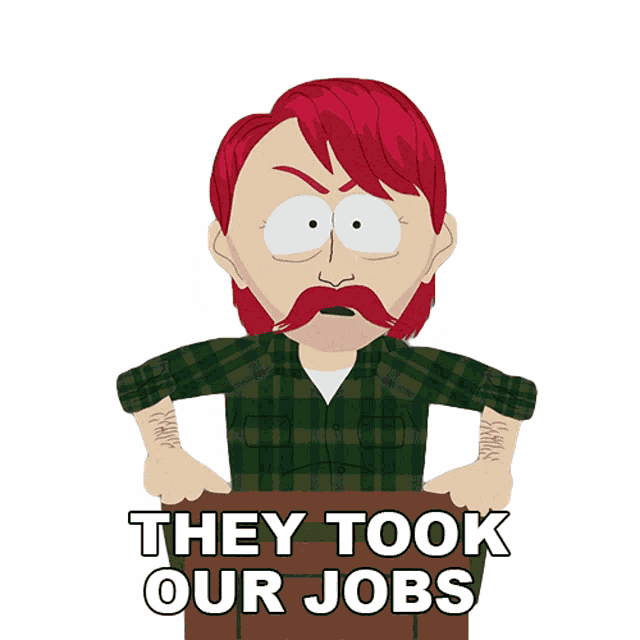Longshoremen Strike: Waxing Nostalgic for the Good Ol' Days

October 1, 2024 – Newark, NJ
In a display of solidarity that no one asked for and even fewer understand, Harrold Daggett, the bombastic head honcho of the International Longshoremen’s Association (ILA), launched a massive strike today, proudly declaring, “We also stand in solidarity with the International Candlemakers Union.” If you’re wondering what cargo-handling longshoremen and candle-makers have in common, you’re not alone. It’s as if Daggett decided to add a dash of medieval flair to an already absurd labor dispute, because what better way to fight modern industry than to hitch your wagon to a technology obsolete since the advent of light bulbs?
At ports up and down the Eastern Seaboard, longshoremen—those champions of 19th-century work conditions—have ground everything to a halt, because in the 21st century, nothing screams “relevant” quite like standing shoulder-to-shoulder with candlemakers. “Look, it’s a horrible disaster in North Carolina. It’d be a shame if no relief could get there,” Daggett said, somehow managing to keep a straight face as he held hurricane victims hostage to his union’s demands. The irony of threatening to block disaster aid while waving the flag of worker solidarity might be lost on Daggett, but it’s not lost on the rest of us. Apparently, the ILA thinks America can just go back to using oil lamps until the union gets what it wants.
But let’s not forget the real crux of the issue here: automation. You see, the longshoremen—whose average day involves moving containers with equipment their grandfathers would recognize—are terrified of the idea that robots might take over their jobs. And what better way to resist progress than by forming an alliance with people whose entire profession involves pouring wax into molds? It’s almost poetic, really. The longshoremen have found their kindred spirits: a group of workers whose skills peaked in the 1700s. If anyone knows how to stop the march of time, it’s the folks who still make a living off candles in an era of LED lights and solar panels.
To Daggett and his brethren, automation is a boogeyman lurking in the shadows, ready to make dock work faster, safer, and—most frightening of all—more efficient. The ILA’s motto might as well be, “If it ain’t broke, don’t fix it,” except they’ve been standing in the way of every technological improvement since the cotton gin. Robots that could load and unload ships with a fraction of the errors? “Not on our watch,” says Daggett, whose vision of the future apparently involves horse-drawn carriages and men with mutton chops.
Meanwhile, as the longshoremen bemoan the inevitability of automation, the candlemakers are happy to play along in this charade. Why wouldn’t they? They’re living proof that you can hold onto an outdated skill set forever if you dig in your heels hard enough. But the real genius here is the way the ILA has managed to make their fight against modernization seem noble. They’ll tell you it’s about jobs, fairness, the dignity of labor. What they won’t tell you is that it’s really about clinging to jobs that don’t need to exist in their current form, jobs that would be far better suited to automation—jobs that, frankly, should have been automated years ago.
In today’s world, longshoremen don’t just move crates anymore—they fight against anything that might make the process smoother, faster, and cheaper. And now, with the candlemakers as their unlikely co-stars in this drama, they’ve managed to turn their strike into a grand farce. Candlemakers, for crying out loud! Is this supposed to be a union for the future, or a tribute to the days when whale oil was a hot commodity?
The timing couldn’t be worse for anyone who isn’t a longshoreman or a candle-making enthusiast. With the U.S. economy teetering on the edge of recession, Daggett and his crew have chosen now, of all times, to bring shipping to a standstill. Why? Because the world might be collapsing, but the ILA still thinks it’s 1924, not 2024. “Let’s paralyze the economy,” they seem to say, “and make sure no one forgets that we still have the power to turn back the clock.”
Meanwhile, in North Carolina, relief supplies for the latest hurricane are stuck in warehouses, gathering dust while the longshoremen play the victim. “It’d be such a shame if no aid could get through,” Daggett intones, like a mustache-twirling villain in a silent film. The rest of the country can just wait—especially disaster victims. Nothing says “worker empowerment” quite like using human suffering as a bargaining chip.
In typical fashion, the ILA is pretending this is all about protecting workers. But what they’re really protecting is their iron grip on an industry that’s long overdue for a makeover. The truth is, they’re scared—scared of being replaced by robots that don’t demand overtime, don’t go on strike, and don’t require solidarity with candle-makers to justify their existence.
And speaking of candle-makers, let’s take a moment to appreciate the sheer absurdity of it all. Who knew that the future of American labor relations would involve a return to the cottage industries of yore? What’s next, the blacksmiths union joining forces with the auto industry to protest electric cars? Or maybe the buggy-whip makers will team up with Uber drivers to protest self-driving cars. The possibilities are endless when you’re fighting progress with nostalgia.
Of course, President Biden, ever the optimist, chimed in with his usual dose of hope, saying, “Come on, man, we’ve worked through bigger problems than this.” Sure, Joe, we’ve handled bigger problems, but it’s been a while since we’ve had to deal with a labor dispute that seems ripped straight from the pages of a history book. But maybe Biden’s right. Maybe if we just wait long enough, the ILA will realize that the future doesn’t involve candles, and the economy won’t grind to a halt every time Daggett gets a bee in his bonnet about technology.
In the meantime, the rest of us can sit back and watch as America’s ports remain clogged with goods that could have been unloaded yesterday, while Daggett and his merry band of dockworkers puff out their chests and pretend they’re leading the charge against some great evil. It’s not automation they’re fighting, though—it’s their own irrelevance. But fear not, they have candles to light the way backward, one wax-dripped step at a time.






